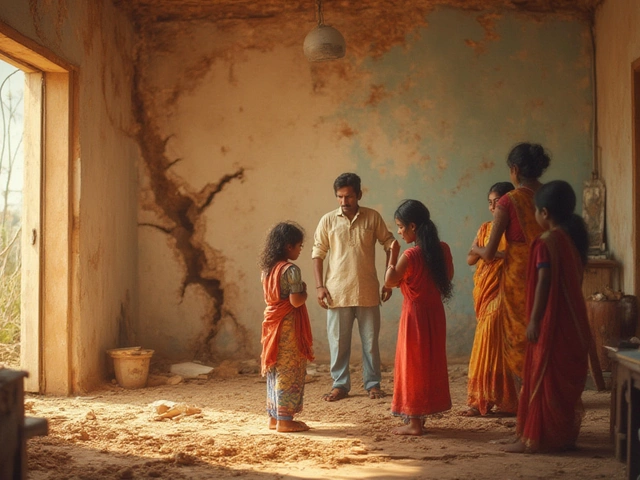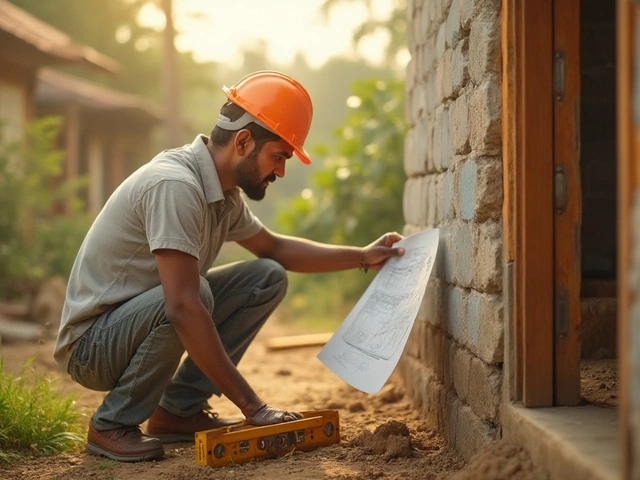So, you're sitting in your cozy living room when you hear a mysterious creak from somewhere in the house. Is your home trying to tell you something? It might just be the foundation hiccuping. Foundation issues are more common than you think and can really mess with the structural integrity of your home.
Cracks in walls, doors that don’t shut right, or even floors that aren’t quite level anymore—these are all signs screaming, 'Take a look at your foundation!' Ignoring them could lead to bigger and costlier problems down the road.
Let’s get real. Can a house really fall apart because of a wonky foundation? Not overnight, but letting those issues slide can definitely make the place feel less stable. Plus, who wants to gamble with gravity when you don’t have to?
Knowing what to watch for and acting quickly can make a world of difference. Trust me, when it comes to your home—an ounce of prevention saves you a bunch of headaches and a lot of cash.
- Understanding Foundation Issues
- Signs Your Foundation Might Be in Trouble
- The Real Risks: Can a House Actually Collapse?
- What to Do If You Suspect a Problem
Understanding Foundation Issues
Alright, let's talk about the heart of your home—the foundation. Think of it as the base that holds everything up, much like the roots of a tree. When the foundation goes south, so does the rest of the house. Understanding what can mess with your foundation is the first step in keeping it in tip-top shape.
First off, let's chat about soil. Yep, the very ground your house sits on can play a huge role in foundation problems. Expansive soils, like clay, expand and contract with weather changes. This movement can put stress on the foundation, leading to cracks or shifts. Foundation issues are usually a hassle with clay-rich environments.
Next up, water is sneaky. Too much water, thanks to poor drainage or leaky plumbing, can make the soil swell. Alternatively, very dry conditions may cause the soil to shrink away from the foundation. Either way, your home’s base gets all wobbly.
Might seem odd, but trees could also be culprits! Roots searching for water can sneak under and around your home, unsettling the soil and causing the foundation to shift. This is why it's often best to keep large trees a safe distance from your home.
A quick tip: Pay attention to the local climate and your home’s surroundings. Weather, soil, and even vegetation can tell you if your foundation might be in for a rough time. And let's not forget about age. Just like us, houses show signs of wear and tear over time. An old foundation needs a little more TLC to stay stable.
Stay informed and proactive about these foundation issues, and you’re on the right path to keeping your home standing strong for the long haul.
Signs Your Foundation Might Be in Trouble
You've probably heard the old saying, 'Home is where the heart is,' but what if your home's heart—its foundation—isn't quite ticking right?
Spotting signs of trouble early can save you from real headaches. Here’s what you should keep an eye on:
- Cracks in Walls and Floors: Probably the most obvious red flag. Hairline cracks can be pretty normal, but jagged and wide ones? They might spell disaster if you don't act.
- Sticking Doors and Windows: When your doors won't shut smoothly or windows are a pain to open, it could mean your house isn't sitting as it should.
- Uneven Floors: Seriously, watch your step! If it feels like you’re walking in some kind of funhouse, it's time to check the floor level.
- Gaps Around Windows and Doors: These gaps shouldn't exist and could mean your foundation is on the move.
- Moisture in the Basement: If your basement starts to resemble a swamp or even just feels damp, it could be a sign of foundation cracks allowing water in.
Believe it or not, experts say over 80% of homes in the U.S. experience foundation issues at some point. It's not exactly comforting, but it underscores how important it is to stay vigilant.
Addressing these signs early can mean cheaper fixes and avoiding the larger costs associated with structural repairs. Usually, a professional evaluation is the best way forward if you notice any of these issues. Don't wait for a small problem to snowball into a giant mess!

The Real Risks: Can a House Actually Collapse?
It’s not just doom and gloom; a house collapsing due to foundation issues could happen, but it’s usually a long time coming. Let’s break down what actually goes down when a foundation starts to fail.
Most structural problems evolve over years, not days. Still, a compromised foundation can make a house feel like it's hanging in the balance. Here’s when things start to get hairy: when the foundation settles unevenly or shifts dramatically, it can create stress points in the structure. Think of it like a game of Jenga where one bad move can bring the whole tower down.
If you've got major cracks in the foundation, doors refusing to close, and floors that slope like a ski slope—these are red flags. If left unchecked, they could lead to severe damage, potentially even collapse under worst-case scenarios.
So, what are the odds? Pretty low if you catch things early. Most houses with foundation repair needs don’t fall apart, thanks to timely interventions from the pros. But ignoring clear signs? That’s when you’re playing with fire.
There’s some solid peace of mind in numbers. Houses with timely foundation repairs often see boosted structural integrity, reducing the collapse risk dramatically.
| Risk Factor | Possibility of Collapse |
|---|---|
| Severe Cracks | High |
| Poor Drainage | Moderate |
| Tilted Floors | Moderate |
Taking action sooner rather than later is key. Even if it's just a hint of an issue, consulting a structural engineer can spare you sleepless nights. Because let's face it, no one sleeps well in a house that feels like it might turn into a pancake overnight.
What to Do If You Suspect a Problem
Okay, so you've noticed some worrying signs of foundation issues around your beloved abode. What now? First things first, don’t panic. Let’s walk through some steps to get it sorted before your house becomes an unwanted DIY disaster.
- Inspect and Document: Grab your phone and take photos of any cracks or oddities you spot. This will help keep track of changes over time and give you something to show a pro.
- Get a Professional Assessment: Call in the experts. A structural engineer can tell you what's really going on beneath the surface. As John Davis, a reputable structural engineer, put it,
"Ignoring small foundation problems can lead to major issues. It's crucial to address them early."
- Consider Repair Options: Once the pros give you the lowdown, they'll likely recommend some repair options. Foundation repairs can vary—from patch-ups to full-blown overhauls. The type of repair you’ll need depends on the severity of the problem.
- Budget and Plan: Some repairs can be pricey, so be prepared to budget accordingly. If it’s a big fix, you might want to prioritize certain repairs. Your contractor should give you a clear game plan.
Beyond that, check if your insurance covers any part of the repair. Most plans don’t, but it never hurts to ask.
Oh, and one quick tip: keep the soil around your home monitored for moisture content. Proper drainage and maintaining a balanced moisture level can prevent further foundation issues in the future. You’ll thank yourself later.
So, all loaded up with this info? You should be feeling more ready to handle any potential house hiccups. Stay proactive, and your home will thank you.


